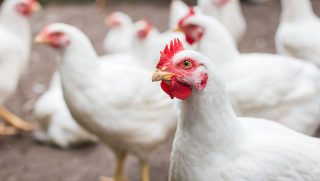I was one of those students who didn’t fit into my FFA chapter, so when I was selected after interviews to run for Region II FFA president, I was shocked. Elated! I gave my speech, hoped and prayed — and lost the election. When the same thing happened the following year, I was devastated. It hurt, I felt like a loser, and wondered if I’d ever realize my dream of being a State FFA Officer.
As an adult, it’s easy to look back on this experience with a different lens. As one former FFA advisor noted, “The destination stands second to the journey.” In other words, the lessons we learn along the way are far more important than the accomplishment.
I know it doesn’t always feel this way, but there are much bigger things ahead.
Glen Groth and Caitin Keck, both accomplished ag professionals in Minnesota, had similar experiences.
Glen said, “It’s OK if they don’t win that livestock show or speaking contest or get elected to that office. I damn near broke myself trying to reach every goal I set that I lost sight of the fact that these youth organizations are part of life’s journey and not the final destination.”
Caitlin was quick to add, “I was the low score on my dairy judging team at the region contest one year. A teammate decided to step off the team for the state contest since he had two more years to participate and let me go to state. My team won, went onto compete at the national contest and then at the international contest! And I went on to compete at the collegiate level and eventually placed fourth at Expo. It was a great learning experience. And the times that I didn’t succeed were humbling for sure. There’s a balance, and you will not reach every goal, but every experience is a learning opportunity.”
I recently asked my Facebook community: “What words of advice would you offer about managing stress and anxiety for FFA members and young people?”
One medical professional said, “Encourage becoming as ‘self-aware’ as possible on their own personality tendencies. Also the importance of finding a mentor, embracing failures as learning opportunities, and healthy coping mechanisms versus unhealthy ones.”
Many people noted that recognizing feelings of stress and anxiety is necessary, and it’s OK to feel the way you do. Agriculture is not great at talking about mental wellness; read how FFA alumnus Maddie Caldwell has learned to discuss mental health after two suicide attempts.
I’d encourage you to engage in the tough conversations and get the help you need.
“Self-talk and beliefs are critical to well-being as thoughts can either hurt or help. If it’s true that 80 percent of our 60,000 thoughts a day are negative, then the work on self-talk and self-compassion may be helpful for teens to learn as coping mechanisms,” notes Lynn Shaw, who teaches at the University of Indianapolis.

There’s a lot of people who want to help FFA members and rural youth — these are just a few of the tips that came flooding in from all over the U.S.:
- “Get outside daily! Research shows that getting your hands dirty decreased stress and anxiety” — Katelin Benkoski, a recent University of Georgia graduate who works for AgSouth Farm Credit
- “Start small … think about what you lke doing. Small decisions make big decisions a little clearer,” — Ashley Rose with Ohio Farm Bureau
- “FFA could be a perfect place to start more mentoring opportunities connecting youth to adults. Zoom helps us connect even if we don’t live close by. A mentor can be a coach, friend, guide and provide hope.” — Joan Ruskamp, Nebraska farmer
- “Enjoy these moments now, you will miss FFA and always remember the good times (and believe it or not, you will forget the stressful times down the road). Breathe, make memories, and don’t be afraid to make mistakes now when you have your awesome FFA advisors and classmates for support!” — Dusty Johnson, in Colorado
- “Take time to meditate daily. Exercise, fresh air. Share your concerns with your family and let them lift the load that is weighing you down,” — Bill Knapke, a farmer in Ohio.
- “Leave yourself margin. Don’t fill every second with tasks. Schedule some breaks.” — Jason Meadows, a pharmacist and rancher in Missouri
- “Choose a few things and do them well. Learn this before you’re 40.” — Extension Educator Sarah Bedgar in North Dakota.
- “Keep a detailed calendar and available at all events so you don’t double book or overbook yourself. learn how to balance and prioritize commitments-school work, FFA duties, CDE training, SAE, sports, work, church, etc.” — Kevin Sox, South Carolina ag ed teacher
- “Failure is temporary. Keep a longer-term perspective and know that things will improve.” — Matt Hargreaves, in Idaho
Cassie Sonnetag, who works with Wisconsin Farm Bureau, reminds you to prioritize your mental self-care. “In the current day and age, youth are increasingly expected to do more, more, more … but prioritizing their mental well-being is just as important as physical well-being. It’s OK to say no to opportunities that do not fill your cup or build you up.
“One of the items I would write to my younger self would be explore ways to rest. It’s essential to know what rest tools you have to manage stress and anxiety,“ said Dana Peterson in Kansas. She raises a good point; each of us need tools to handle stress and getting enough sleep is essential to good decision-making. You can find practical tips to manage stress in this article.
It’s been decades since I lost that regional FFA presidency — and I do remember the disappointment — but what came next brought so much more meaning to my life. I was elected to serve Michigan as a state officer, coached a lot of FFA members in the years since, and raised millions of dollars for the National FFA Foundation to give back to the blue and gold.
You don’t know what’s around the corner. Always keep your future and the greater good in mind when life doesn’t go your way. Please remember that you’re not alone in your struggles; talk with others to find support.
Michele Payn speaks and writes to help the people of agriculture have the tough conversations about managing stress, connecting with consumers, and making sense of science. Learn more at causematters.com/growthjournal or follow @mpaynspeaker on social media.



